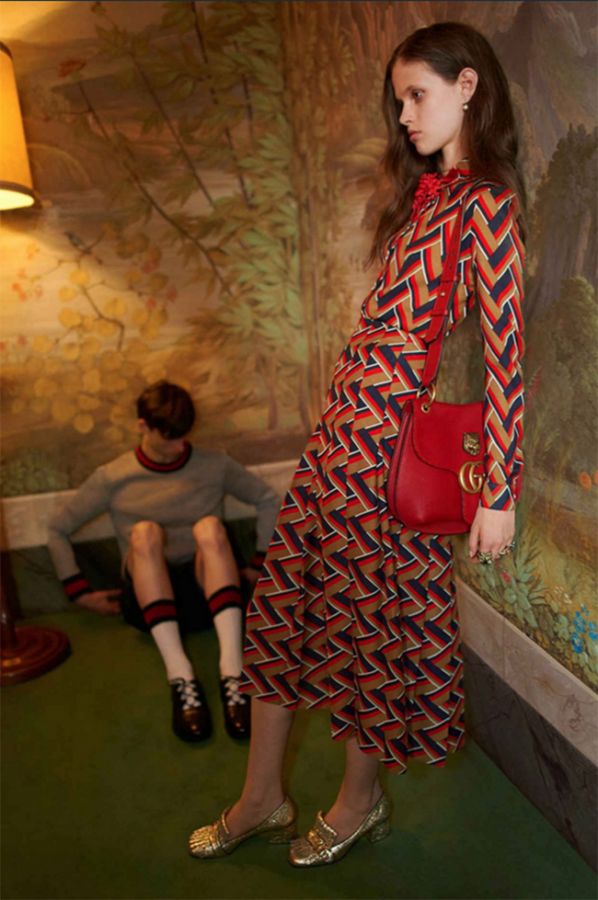Moderate Progress Toward Body Positivity Is Not Enough
Gucci’s ad campaign, Cruise 2016 was recently banned in the UK by the Advertising Standards Authority because the model was too thin.
April 19, 2016
In December 2015, Gucci released its Cruise 2016 ad campaign on The Times’ UK website that is now banned in the UK by the Advertising Standards Authority. The ad, which includes both a video and still photos, features very tall and thin models inside a luxurious mansion, dancing and posing with the elegant furniture. In its report, the ASA determined that one model in particular seemed to be “unhealthily thin,” as her upper body “appeared to be out of proportion with her head and lower body.” In June of last year, the ASA also banned an Yves Saint Laurent ad for featuring an “unhealthily underweight” model.
The fashion industry has a long-running reputation for featuring the slimmest of models. Most models in the industry face criticism and rejection, being told that they don’t have the look a company was searching for or aren’t thin enough for a particular campaign. Just last month, Victoria’s Secret model Erin Heatherton revealed her past battles with her body image in an emotional Instagram post.
“I was struggling with my body image and the pressures to fulfill the demands of perfectionism upon me,” Heatherton wrote.
With every model that gets their big break, there are hundreds more struggling with their bodies behind the scenes.
Recently, the popular clothing chain American Eagle has been doing their part to change the slim status quo. In 2014, the company’s lingerie brand, Aerie, launched Aerie Real, a campaign of un-retouched advertisements featuring girls of multiple body types. In January 2016, Aerie went one step further: they recruited their first ever full-figured model, Barbara “Barbie” Ferreira, to be the face of their latest swimwear campaign.
In the behind-the-scenes video, Barbie says, “Not being retouched in the images is something that is very important to me…people knowing that that’s what I look like without anyone’s perception of what my body needs to look like.”
Aerie’s body-positive stance is just one of many making their mark on fashion advertising. Sports Illustrated took a huge step in the right direction when they chose to have plus-sized model Ashley Graham be the cover star for the 2016 edition of their annual swimsuit issue. Dove’s “Real Beauty” campaign, which was launched over a decade ago, features diverse groups of real women — not models — of all shapes and sizes.
Victoria’s Secret was quick to change the slogan of their 2014 “A Perfect Body” campaign, which promoted their “Body” bra, to “A Body for Every Body” once the backlash came pouring in. The advertisements featured 10 of their most famous lingerie models posing in the brand’s newest line; the images implied that to have the perfect body, one must look like a Victoria’s Secret model, placing yet another unattainable standard on women’s bodies. Within days, a Change.org petition received over 33,000 signatures, leading the brand to change their advertising approach.
There is a newfound awareness of the fashion industry’s missteps. People are stepping up and taking action against the messages advertisements and are righting the wrongs they see, but the problem is still there. As shown by Erin Heatherton’s story of body image issues, the companies that have already been called out for their body-shaming advertisements are still pushing the idea of the perfect body on their models.
What does this all mean for the fashion industry? Is body positivity truly starting to reach all corners of fashion and modeling? Bold moves are being made by brands around the world, encouraging women, and young women especially, to love their bodies and be confident in who they are. More accessible and familiar brands, like Aerie and Dove, have been on board with body positivity for years. With the recent banning of Gucci’s Cruise 2016 campaign, the high-fashion brands may be finally starting to get the message.
Email Lauren Tavares at [email protected].



























































































































































